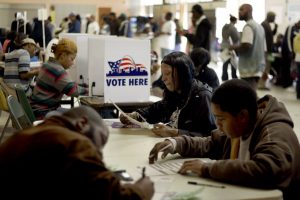
Photo by Jeff Roberson/AP Photo
A federal court of appeals struck down North Carolina’s voter ID law Friday, asserting that it was “passed with racially discriminatory intent.” The ruling also reinstated same-day registration, early voting, preregistration, and out-of-precinct voting.
According to Politico, the three-judge panel from the 4th Circuit Court of Appeals were unanimous in their ruling that the Republican-controlled North Carolina legislature violated the U.S. Constitution and the Voting Rights Act three years ago by enacting policies that required voters to present certain types of photo ID in order to cast their ballots.
“The record makes clear that the historical origin of the challenged provisions in this statute is not the innocuous back-and-forth of routine partisan struggle that the State suggests and that the district court accepted,” Judge Diana Motz wrote on behalf of Judges James Wynn and Henry Floyd. “Rather, the General Assembly enacted them in the immediate aftermath of unprecedented African American voter participation in a state with a troubled racial history and racially polarized voting. The district court clearly erred in ignoring or dismissing this historical background evidence, all of which supports a finding of discriminatory intent.”
In simpler terms, North Carolina lawmakers passed legislation that deliberately worked to suppress the Black vote.
The 2013 state law made drastic changes to election rules, including a requirement that voters show one of six qualifying ID’s, the elimination of same-day voting, a ban on out-of-precinct voting, and a policy that curtailed the period of early voting, BBC News reports. Voters who didn’t have a valid ID, however, we’re allowed to cast their ballots once they signed an affidavit indicating they had a “reasonable impediment” that prevented them from getting one.
According to the three-judge panel, data showed that these new policies disproportionately affected African-American voters.
“We recognize that elections have consequences, but winning an election does not empower anyone in any party to engage in purposeful racial discrimination,” the panel wrote. “When a legislature dominated by one party has dismantled barriers to African American access to the franchise, even if done to gain votes, ‘politics as usual’ does not allow a legislature dominated by the other party to re-erect those barriers.”
Friday’s decision reversed a lower court ruling in April, which upheld the discriminatory voter ID law, according to BBC News. State legislators defended the law, saying it was means of preventing voter fraud.
Per the Seattle Times, the U.S. Department of Justice, North Carolina NAACP, and League of Women Voters among others have sued the state, asserting that its restrictive policies violated the 1965 Voting Rights Act and U.S. Constitution.
“This is a strong rebuke to what the North Carolina General Assembly did in 2013,” said Allison Riggs of the League of Women Voters. “It’s a powerful precedent that…federal courts will protect voting rights of voters of color.”
Now that the law has been overturned, it’s hoped that voter participation among Black and Latino voters will increase at the polls this November.
According to Politico, the state of North Carolina will have a chance to appeal the court’s decision to either the full bench of the 4th Circuit Court of Appeals or to the Supreme Court. However, it’s highly unlikely that the courts will reinstate the voter ID laws or other voting-related amendments ahead of election day.
“We cannot ignore the record evidence that, because of race, the legislature enacted one of the largest restrictions of the franchise in modern North Carolina history,” Motz wrote.
Motz also dealt a scathing rebuke to U.S. District Court Judge Thomas Schroeder, who published a 485-page decision in April upholding the discriminatory law, Politico reports. The judge asserted Schroeder had ample evidence to prove the law was biased, but never put two and two together.
“The district court clearly erred” when it failed to find discriminatory intent and when it believed North Carolina’s interests in passing the legislation to be compelling, she wrote. “This error resulted from the court’s consideration of each piece of evidence in a vacuum, rather than engaging in the totality of the circumstances analysis required….Any individual piece of evidence can seem innocuous when viewed alone, but gains an entirely different meaning when considered in context.”
Just last week, a federal court ruled that the voter ID laws in Texas also violated the Voting Rights Act and openly discriminated against Black and Latino voters. According to Atlanta Blacks Star, the ruling softened restrictive policies that left over 600,000 Texans, many of whom are racial minorities, unable to vote because they didn’t have the proper forms of ID. While the court’s decision didn’t overturn the law completely, the Lone Star state is now required to find ways to accommodate potential voters who may have trouble getting their hands on qualifying forms of identification.

